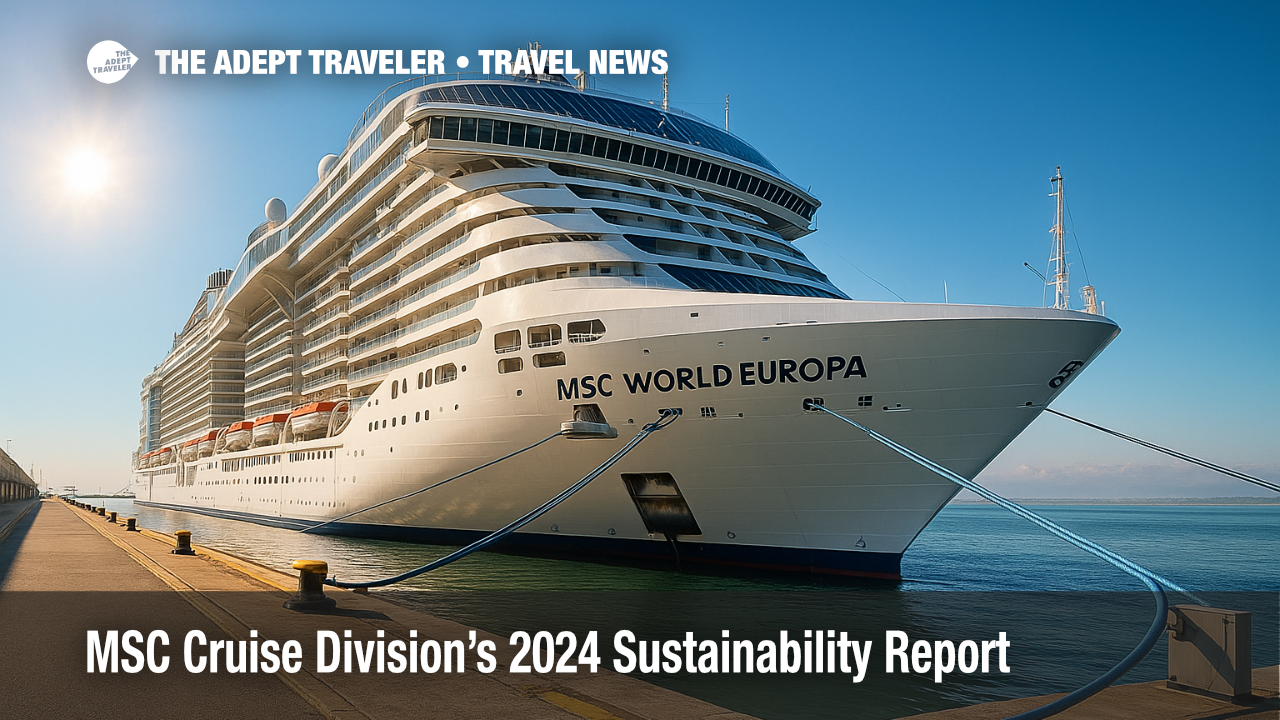MSC Cruise Division's 2024 Sustainability Report Charts Net-Zero Course

Marking a pivotal year of progress, MSC Group's Cruise Division has released its 2024 Sustainability Report and a companion Energy Transition Plan, underscoring its pledge to reach net-zero greenhouse-gas emissions by 2050. The sixth annual report details new fuel-flexible ships, powerful digital-efficiency tools, and a sharp rise in shore-power connections across the fleets of MSC Cruises and Explora Journeys. Executive Chairman Pierfrancesco Vago said the strategy is designed "for future generations," balancing environmental stewardship with social impact and economic resilience.
Key Points
- Why it matters: MSC controls the world's third-largest cruise fleet, so its decarbonisation path shapes industry standards.
- Debuted an independently verified Energy Transition Plan, setting interim emissions-cut targets for both brands.
- Fleet-wide optimisation software avoided 50 000 tons of CO₂ in 2024, boosting real-time itinerary efficiency.
- Shore-power hookups tripled year-on-year to 142 connections across 13 ports, with every newbuild wired for plug-in power.
- New report signals more transparent tracking of social metrics, including employee engagement and destination stewardship.
Snapshot
MSC Cruise Division's report presents a multilayer roadmap that blends technology, operations, and fuel strategy. New LNG-ready and dual-fuel engines allow vessels to switch to lower-carbon alternatives as supply scales. Digital twins, OptiCruise itinerary modelling, and the Oceanly Performance platform now feed thousands of data points back to fleet controllers, trimming speed, hotel load, and routing for optimal burn. Meanwhile, shore-power retrofits mean more than 70 percent of the fleet can shut down engines in port by year-end 2024-vital for reducing local air and noise pollution in marquee destinations. The document also highlights community work at Ocean Cay, where coral nurseries and turtle nesting have rebounded.
Background
MSC published its first cruise sustainability report in 2019; since then carbon-intensity has fallen by a third even as capacity grew. In 2021 the company aligned with the IMO's 2050 net-zero vision and began commissioning LNG ships such as MSC World Europa and MSC Euribia. The 2023 report introduced a 40-percent carbon-intensity cut target for 2030, while 2024 shifts focus to absolute emissions, mirroring EU Fit-for-55 rules and forthcoming U.S. port mandates. Explora Journeys, launched in 2023, shares the same technical backbone and contributes data from its smaller, boutique vessels. The Cruise Division's sustainability governance sits within a wider MSC Group framework that also covers cargo, terminals, and logistics, allowing cross-segment R&D on fuels and battery systems.
Latest Developments
Fuel-Flexible Fleet and Digital Efficiency
The Energy Transition Plan sets staged emission-cut milestones: 30 percent by 2030, 75 percent by 2040, and net-zero by 2050. To reach them, all new ships since 2017 feature multi-fuel engines capable of running on LNG, bio-LNG, and-once certified-green methanol. On the digital side, OptiCruise now models proposed itineraries four years ahead, factoring port congestion, speed windows, and hotel loads, while Oceanly Performance ingests live telemetry to tweak trim and HVAC in real time. Early trials saved roughly two days of fuel across a seven-night sailing, creating the 50 000-ton CO₂ reduction cited for 2024. These tools, paired with hull coatings and LED retrofits, anchor MSC's goal of cutting overall energy use per guest night without sacrificing experience.
Shore-Power Rollout Gains Speed
Plug-in capability is expanding rapidly as ports from Hamburg to Brooklyn finish high-voltage installations. MSC logged just 44 connections in 2023; that figure jumped to 142 last year across 13 locations, including Barcelona's new terminal designed exclusively for shore power. Every vessel delivered after 2017 is "cold-ironing ready," and a retrofit program is progressing through older tonnage at roughly four ships per year. The division pledges to use electrical hookups wherever a compatible berth exists, a move expected to slash auxiliary-engine emissions during overnight stays by up to 98 percent.
Analysis
MSC's 2024 report is notable for shifting from intensity-based rhetoric to absolute-emissions targets, a step many cruise peers have yet to formalise. By pairing fuel-flexible hardware with software-driven optimisation, the company hedges against uncertain future fuel availability while banking immediate savings. Its tripling of shore-power connections signals that port-side collaboration-long a bottleneck-has begun to accelerate, particularly in Europe and select U.S. hubs. The OptiCruise and Oceanly Performance platforms also reveal a broader trend: digital twins are moving from proof-of-concept to fleet-wide standard, offering cruise lines a cost-effective decarbonisation lever while industry-scale green fuels ramp up. Socially, the report's emphasis on crew engagement and destination restoration-though light on granular metrics-aligns with growing stakeholder scrutiny over labour practices and overtourism. Taken together, the Cruise Division's dual focus on technological agility and transparent reporting strengthens its competitive position as regulators inch toward lifecycle carbon accounting and coastal communities demand cleaner operations.
Final Thoughts
MSC Cruise Division's 2024 Sustainability Report positions the line as a frontrunner in cruise decarbonisation, marrying fuel-flexible ships with smart-data efficiency and an aggressive shore-power agenda. Continued investment in digital tools and renewable-fuel trials will be critical to meeting its staged goals, yet the roadmap outlined here gives travelers and port partners tangible yardsticks for progress. In an era when environmental credibility influences booking decisions, the company's detailed blueprint for net-zero cruising could prove a decisive advantage-solidifying trust while propelling the wider industry toward cleaner seas and skies. MSC Cruise Division sustainability report.
